The ABCs of Innovation and Prosperity for the Good of All (Part I)
“How do we ensure a future where all people have the economic opportunities they need to reach their full potential without depleting the environment that sustains us all?”
Camilo Galvis, executive director of the abc* Foundation, posed this question to frame the messages of more than a dozen top leaders and heroes of our time, 21 selected social entrepreneurs from Ashoka, and more than 400 invited business, social, science, media, policy and thought and action leaders from as far away as Zimbabwe and South Africa and as near to Miami as Mexico over two days in early November.
Now in its third year, the 2013 abc* Continuity Forum is a surprisingly friendly mashup – equal parts star power, investor strength, visionary and ethical leadership and humble, courageous persistence changing communities and nations. It sparks personal connections and contagious enthusiasm for new collaborations to scale good ideas. For those working in emerging economies on almost any issue – education, water, reforestation, conflict resolution, nutrition, health, housing, renewable energy, recycling, and so on – the facts, ideas and emerging new solutions shared are right on target.
All the key speakers considered twin challenges: What does the future hold for your field? And how do you answer Galvis’ question?

For Arianna Huffington, insights from the rise of the Huffington Post from a disruptive startup to a respected media source for 80 million unique views each day, the future of media is clear: “Journalism’s old rule, ‘If it bleeds it leads’ needs to be destroyed. Journalism must expose what is corrupt, dysfunctional in society, yes. But it has an equal responsibility to spotlight what is innovative and what is proven to be working.”
Not only that, but “People used to read the morning paper for information. Not anymore. Information is available 24/7, instantly, online, on phone screens…People now are searching for meaning,” Huffington said. “So we have an expanded view of bringing news to include millions of people around the world who want to tell their stories, their truths, to become the news. Self-expression, citizen journalism, different perspectives are a source of great interest; media has become their platform.”
Huffington said media’s business model has changed radically: “Ubiquity trumps exclusivity,” she said. “It is how value will be created now and in the future. Cross-posting great articles or posts and widening the pool of who writes them builds far more value for the media source – as well as its contributors.”
And in answer to Galvis’ question? “These changes mean journalism still needs to speak truth to power, and also help scale bottom-up innovations. Media is not just for reporting the lives people settle for, but helping to make people’s lives better. The new business plan for media is to transition from a model of presentation to a model of participation. It’s clear: we’re all in this together.”

Jeffrey Hollender, co-founder of Seventh Generation Inc, a leading manufacturer and distributor of natural products with over $150 million in sales reported in 2010, frankly said: “The top priority now is ‘How to do good, better.’ I think businesses must lead the way… We need to not settle for incremental improvements, but constantly ask: What is the best this can be? Have we found a way it serves its purpose and is good for communities, for the planet?”
Hollender added: “Many businesses deny the biggest challenges we all face. Climate change. Water. Nutrition. ‘Not business’s problem,’ they say. Or they see CSR as their solution. It’s not enough. We need to face that doing ‘good’ is not doing ‘less bad.’ We currently support new things that are ‘less damaging’ rather than focus our inventions on things much better,” he said.
Hollender believes the most critical thing now is for everyone to learn systems thinking. “All the great ideas we need to invent will come from seeing the causes and effects and interrelationships all around,” he said, urging business leaders to support efforts to “teach kids as early as elementary school about the ‘systems’ we live in and how we are all interconnected.” At work, he said, they should ”teach all employees how to do systems thinking: for design, for invention, for marketing, for everything; meditate to reconnect to our inner values daily and bring them directly into tasks at work; learn to collaborate better; and understand that social inequity is inextricably tied to environmental sustainability. We should use this as a litmus test of all we do.
“The more we do the above,” he concluded, ”the more we will see a decline in ‘one-off’ solutions to pieces of problems – and instead see an increase in solutions that get to the core of the problem.”

Addressing environment and sustainability directly, Mark Tercek, CEO of the Nature Conservancy, said he had learned over the years that bold new approaches, radical partners and forceful collaborations are essential. When he’s asked, “How do we accelerate protecting the environment? How do we scale up solutions that work? How will we ultimate protect nature?” His answer? “Invest in it.”
Of course to do this successfully, he says we must “Develop better metrics to ‘value’ nature. Recognize, measure and account for nature as capital, or green infrastructure. Assign a real dollar value for its use, its damage, its clean up, its improvement. Companies can then carefully choose what resources are used, what damage is done from their processes, what innovations can stop damage and create benefit? Or to invent alternatives using natural resources differently. Clear metrics available to the public empowers consumers to choose to buy from companies that are doing the right things.” He added, “Scale will elude us until transparent environmental accounting is developed, adopted and shared with all – so that incentives reward good practices and expand them, and penalties offset the ill effects of poor practices and diminish them.”
Tercek said his major challenge was to “Get more people to see the relationship of the environment with business and society – for the long term, their children’s and grandchildren’s futures – expand the numbers who see the equation clearly, regardless of their politics.” He said his experience was “there was usually so much benefit to be had in common in these collaborative solutions, that they convinced even skeptics to leave their differences aside and work together for the larger good.”
Example: Quito, Ecuador, faced a potable water shortage amid rising population growth. The city planned to invest in a “gray water” purification plant costing many millions and not add more pure water to the total. The Nature Conservatory got involved, and saw possibilities for a much cheaper and better plan. Upstream from Quito, where poor farming practices and logging polluted the water source, actions could be taken to restore the environment, paid for by investors interested in developing sustainable agriculture from reclaimed soils, and reforestation efforts. This would increase corporate profits and incomes in local communities – and provide Quito pure water long-term. The costs of these efforts – plus others such as reviving a condor sanctuary and other habitats for wildlife and recreation – were well below what the purification plant construction would have been. To maintain this system, the city’s user fee for water fell by 50 percent from the fee it was planning to impose after it built the gray water plant. Now, when citizens and businesses pay their water bill, their receipt says, “Thank you for your contribution, making you a “Protector of your country’s natural patrimony’s value.” Click here for details and other examples of the Nature Conservancy’s approach.
I highlight these three speakers because of how different their backgrounds and expertise, yet how similar their visions of the future and success are: We’re all in this together. Systems thinking is essential. Teach it to children and use it in workplaces. Common benefits outweigh individual differences, enabling large solutions. Hierarchy, zero-sum thinking and hyper-competitiveness are no longer as powerful for long-term success as are collaboration, inclusion and new value creation producing good for all. Don’t settle for less harm. Strive for doing much good, faster and better, until it reaches every corner of the planet.
In one way or another, key speakers, including Jane Goodall, Sylvia Earle, Larry Summers, David Axelrod and others, reinforced these same truths with examples from their own experiences.
Interspersed among these leaders were the 21 Ashoka Fellows, selected by the abc* Foundation as having the most potential for their innovations to bring great positive change to the region. And each had a unique story of how these truths push them to transform barriers into opportunity, suffering into joyous potential. Three will be selected by end of November for cash prizes and two years of business, media, mentoring and connections to help them grow their ideas to scale. Check out summaries of their innovations ready to scale here.
Visit NextBillion.net over the next few weeks for more in-depth posts with some of these Fellows and to find out who won. Their ideas, innovations and insights are remarkable.
Rochelle Beck is marketing and communications director for Ashoka’s Full Economic Citizen Initiative.
- Categories
- Impact Assessment
